Use 'Print preview' to check the number of pages and printer settings.
Print functionality varies between browsers.
Printable page generated Thursday, 18 April 2024, 5:47 AM
Study Session 9 Duties and Responsibilities of Water Utilities
Introduction
Provision of safe and adequate drinking water to consumers requires careful planning and management by the water utilities. As water is a basic necessity, supplying drinking water is a continuous process and water utilities focus on the whole management process from the catchment to the source, and finally to the consumers’ taps. Water that is unacceptable in appearance, taste and odour will undermine the confidence of consumers, lead to complaints and, more importantly, lead to the use of water from sources that are less safe. Therefore, it is the responsibility of the water utilities to ensure provision of a safe and acceptable water supply to consumers.
In Study Session 6, you learned about the organisational structure of water utilities and their responsibilities in the operation and maintenance of water treatment and supply systems. In Study Session 7 you considered the particular problems associated with leakage that water utilities face and how they deal with them. In this study session, you will learn more about four key aspects of the duties and responsibilities of water utilities. These are the nature of good governance; the duties of water utilities to keep water treatment plants operational; dealing with customer concerns and complaints; and the various tests and standards for assessing water quality that apply in Ethiopia.
Learning Outcomes for Study Session 9
When you have studied this session, you should be able to:
9.1 Define and use correctly all of the key words printed in bold. (SAQ 9.1)
9.2 Briefly describe the considerations for good governance of a water utility. (SAQ 9.2)
9.3 Describe the various factors to be considered in keeping a water treatment plant operational. (SAQ 9.3)
9.4 List the steps that should be followed in dealing with customer concerns. (SAQ 9.4)
9.5 Outline the main parameters used to define water quality standards. (SAQ 9.5)
9.1 Good governance
The governance of a water utility is about the processes by which it makes decisions and implements them (UNESCAP, n.d.). Good governance can be defined by a collection of characteristics that describe the approach of the utility, or any other organisation, to its decisions and actions. These key characteristics are explained below.
9.1.1 Participation
It is important that all the people who are affected by decisions are allowed to participate in the process of reaching those decisions. Residents’ groups and other stakeholders or their representatives should be consulted as part of any decision-making process (Figure 9.1). Both men and women should be involved. The number and range of stakeholders to be consulted will depend on the project or scheme under discussion. As an example from a wider context, farmers may wish to increase their intake of water from a river for irrigation because they want to improve their crop production. This could affect many other people, especially those who live downstream of the abstraction point on the river, and they should be invited to participate in the deliberations.
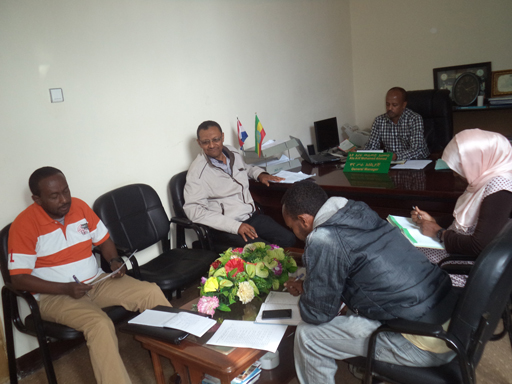
9.1.2 Transparency
When a decision is reached, the way it has been arrived at should be apparent to all, with all the steps documented. So, if it was decided that a dam should be built, details of all the consultations and meetings related to the decision should be available for members of the public to view. Similarly, in the interests of transparency, accounts should be available for public scrutiny, and all the financial decisions should show that value for money was achieved.
9.1.3 Responsiveness
The decision-making process and implementation of decisions must take place within a reasonable period of time. An example would be if a village wanted to have its own water supply system using water from a river, the decision on it should be made within a few months of the request.
9.1.4 Consensus
This is related to participation. As noted above, good governance requires that, for all major projects, consultation with all the stakeholders will be undertaken. Everyone should have the opportunity to put their view forward. The aim in the consultation should be to obtain a consensus, so that the final decision arrived at is in the best interests of the community as a whole. The water utility should play the role of mediator to bring about a decision that minimises any disadvantages to stakeholder groups.
9.1.5 Equity and inclusiveness
It is important that all parties are treated equally and are included in any decision making. The views of all stakeholders should be equally valued. No group should be marginalised, or indeed feel marginalised. It is especially important to consider the needs of vulnerable groups such as low-income families and disabled people (Figure 9.2).
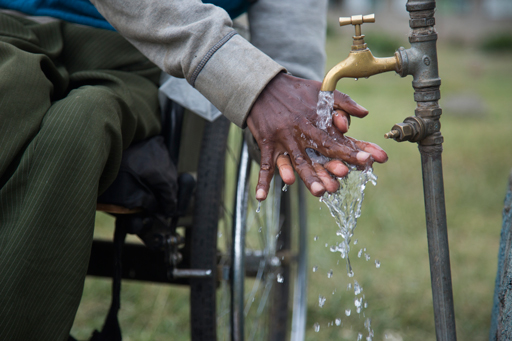
9.1.6 Effectiveness
The actions of the water utility should be effective in addressing the issue concerned. This comes down to having the necessary expertise, and keeping the staff up to date through ongoing training. Staff morale should also be kept high so that staff turnover is kept low.
9.1.7 Efficiency
The resources available to the water utility should be used efficiently so that the greatest benefit is achieved with minimal cost and disruption. Any action should be carried out in consultation with interested parties, so that no duplication of effort takes place. For instance, if a new pipeline is to be laid, this can be done when the cables (for the remote control of water treatment equipment) are being put in, so that the roadway is dug up only once.
For a water utility, it is important to consider sustainability in all its operations, so that long-term viability is assured. For example, choosing a more expensive water treatment control system may mean that the cost of maintenance is reduced (see Figure 6.5 in Study Session 6).
What are the terms used to describe the initial cost and the recurring cost?
Capital cost and operating cost.
9.1.8 Accountability
The water utility has to be accountable to its customers, who are the people affected by its decisions and actions. The water utility has a duty to report on how its funds are used, and how decisions on major issues were arrived at, including on anything untoward that may have happened. This is linked to transparency. Utilities can only be accountable if their activities and processes are known to others.
9.1.9 Independence
The water utility has to be independent of political and commercial influence, in order that an equitable service is provided to all who need water.
9.2 Keeping a water treatment plant operational
The primary responsibility for a water utility is to provide a safe and adequate water supply to the users. From previous study sessions, you have learned about the need for a source of water that is reliable and can provide a sufficient quantity of water to meet demand. You also learned about the need to protect water sources and ensure they are not contaminated by pollutants of any type. Where water treatment is required, the water utility is responsible for keeping the water treatment plant running effectively and efficiently. An important part of this is the operation and maintenance procedures (Figure 9.3) that you learned about in Study Session 6.
What are the two types of maintenance required in water treatment works? Why is one better than the other?
The two types of maintenance are preventive maintenance and breakdown maintenance. Preventive maintenance involves regular checks that everything is working properly. Breakdown maintenance is needed if equipment breaks down. Preventive maintenance is the better approach because it avoids any break in supply, and is usually cheaper.
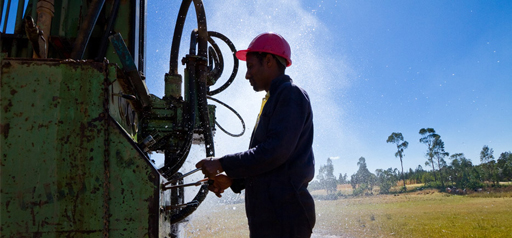
Knowing about the costs of running a water treatment works is a very important part of management. Like any organisation, sound financial management is a key responsibility for the utility. Costs include initial funding to construct the plant and buy the necessary equipment for the treatment processes. Recurring costs include the cost of the staff, power, consumables such as chemicals, and spare parts, repairs and replacement machinery required for maintenance of the plant. In Study Session 6 you also read about the assets of a water supply system and the need for an asset register.
Name three items you would expect to see included in the asset register of a water utility.
You could have answered with any of the items you would expect to see at a water treatment plant or in other parts of the water supply system. This could include the river intakes, surface water reservoirs, boreholes, all the associated pipework and pumps, process units, buildings (offices, plant rooms, etc.), office equipment (computers, office furniture, etc.), laboratories and analytical equipment, vehicles, pumping stations, water mains, and more!
Looking after all the assets is an important responsibility for water utilities; this is known as asset management. Asset management is the systematic process of deploying, operating, maintaining and upgrading facilities cost-effectively, and at the same time providing the best possible service to users. Asset management also ensures that financial resources are available to repair and replace equipment when necessary.
Asset management consists of the following five steps:
- Preparing an asset register.Knowing what assets you have and what their condition is.
- Prioritising your assets. In case you have a limited budget, prioritising helps you to allocate funds to the rehabilitation or replacement of your most important assets.
- Developing an asset management plan. Devising a plan to ensure continuous service delivery, and estimating the amount of money required to do this.
- Implementing your asset management plan. Working with the support of management to carry out the plan, ensuring that the technical and financial means to deliver safe water to your customers are available.
- Reviewing and revising your asset management plan. Your asset management plan should be reviewed regularly because with time the assets will change (for example, due to expansion of treatment plants, or an increase in the coverage of water distribution systems). The plan then has to be revised as necessary.
Unfortunately, even with an excellent asset management plan in place and effective preventive maintenance, the water utility may still find its customers are not always happy and may make complaints. This is the subject of the next section.
9.3 Handling customer complaints
Customer complaints are inevitable and water utilities have a duty to respond to them quickly and efficiently. Water utility offices have a specific department responsible for handling customer complaints. In Study Session 6 this was called the Commercial and Customer Care Department but it may have other names such as the Public Complaints Resolution Department or similar. Complaints such as misreading of a water meter, breakage of a supply pipe, shortage of water, long waiting times for a pipe connection and poor-quality water are common and can be brought to this department by customers in person, through a telephone call or in written form. Many departments use free phone numbers so problems can be reported more easily.
When a complaint is received, the department dispatches a group of technicians to investigate the problem at the site. These technicians are expected to resolve the problem quickly, on the spot if possible. There are targets for repair. For instance, if the issue is a breakage in the customer’s section of pipe (the pipework between the water meter and the house) the pipe has to be repaired within an hour. If the breakage is in the main water line, it should be repaired within three hours.
For people working in the public sector providing a public service such as supplying water to people, no matter how great their services are, the old adage will eventually be proven true: you cannot please all of the people all of the time. Whatever the type of complaint customers have, it is important to remember the following rules when resolving customer service issues.
- Listen to the complaint.The first thing to do is to listen to the complaint (Figure 9.4). Then the root cause of the problem must be ascertained. It could be that it is something to do with the way the water utility operates. Conversely, it could be due to factors outside its control.
- Understand the issue. Next, given the situation, the complaint must be seen from the complainant’s point of view.
The question must be: 'Why did they come here? Is their complaint justified?' A complete picture of their complaint cannot be obtained until it is viewed from their perspective.
It is important to listen, understand and then discuss possible solutions with them in a calm and friendly manner. This comes down to tones and respect. Policies of personnel can be calmly defended but the conversation should not become an argument, as this will not resolve the issue but lead to anger and agression.
- Resolve the complaint. After the complaint has been heard and understood, a solution has to be suggested. If it is a major complaint, it has to be taken to a higher level, as appropriate. Sometimes this move alone is sufficient to resolve the customer’s concerns as it conveys a sense of importance – their complaint is significant enough to be passed to someone higher up in the chain of command. When referring the matter on, the person to whom the complaint has been sent has to be fully informed of the relevant facts before he or she speaks with the customer.
- Document the complaint and how it was resolved. After the customer’s complaint has been resolved, the case has to be documented in writing. This allows staff to refer back to it should a similar complaint arise in the future. Importantly, any recommendations for the water utility to adopt should be noted, to prevent future complaints.
- Learn from the complaint and rectify any problems.Customer complaints should be used as a means to learn about potential flaws in any of the water utility’s systems, and then the flaws should be rectified so that no more complaints arise.
In most situations, by following these five steps, the issue will be resolved to the customer’s satisfaction. There are, however, some issues that simply cannot be resolved. It could be that the customers’ requests are outside the stated policies on such matters, or that they are simply unreasonable. There will not always be an easy solution to this sort of problem but if all internal procedures have been exhausted, customers may have go to an independent party for resolution such as the Town Water Board or Woreda WASH Steering Committee.

9.4 Water quality standards
As mentioned above, customer complaints may be about water quantity and breaks in supply, but they may also be about water quality. This could be an undesirable colour or taste in the water that consumers have detected. More seriously, it could be a problem related to ill health that has been linked to the water supply. To check that the water supplied is both potable and palatable requires standards to be established. Drinking water standards are a set of limits for a wide range of substances, organisms and properties of water, with the protection of public health as the focus.
As you have read, water can contain many different types of biological contaminants. Water is considered a good and universal solvent, which means all kinds of dissolved substances can be found in it as well. As a result, there is a need to have precise assessment methods that are used to test for the presence and concentrations of these substances to find out if they are within the water quality standards. The World Health Organization publishes international guidelines for drinking water quality (WHO, 2011) and most national governments also produce their own country standards.When the standards are breached, it gives a signal to the water supplier to investigate and take remedial action. Although standards are set in Ethiopia, quality assurance is not always present.
In addition to measuring health-related parameters set in international and national drinking water quality standards, water suppliers need to carry out a wide range of analyses important to the operation and maintenance of water treatment and distribution systems. These analyses (Figure 9.5) should include acceptability, which is a critical parameter. (Parameter means a measurable factor.) If the water supplied to the community is not acceptable (for example, because it has a tinge of colour in it due to natural compounds present, which may not be harmful), consumers may choose a more palatable, but possibly unsafe, water source. Acceptability may be assessed by physical observation (such as taste, colour, odour, visible turbidity), without laboratory determinations. Water utilities will monitor the water quality to check that the standards are adhered to.
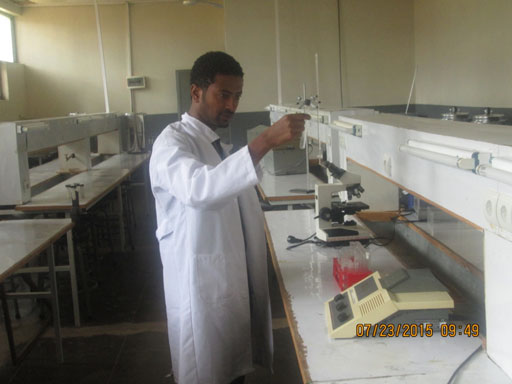
9.4.1 Microbial parameters
Drinking water can be contaminated with human or animal faeces, which are a source of pathogenic bacteria, viruses, protozoa and helminths. Measurement of microbial parameters involves the microbiological tests for faecal contamination that you read about in Study Session 2.
What are the tests widely used to assess faecal contamination?
The usual tests are for total coliform bacteria, faecal coliform bacteria and E. coli.
Table 9.1 shows the Ethiopian bacteriological standards for drinking water. It includes total coliforms and E. coli, and also mentions total visible colonies of organisms (Figure 9.6) and faecal streptococci. These are additional ways of measuring the microbial contamination of water. For all four parameters shown here the standards state that none should be present in drinking water.
| Substance | Maximum permissible level |
| Total visible organisms, colonies per 1 ml | Must not be detectable |
| Faecal streptococci per 100 ml | Must not be detectable |
| E. coli, number per 100 ml | Must not be detectable |
| Total coliform organisms, number per 100 ml | Must not be detectable |
To conduct a visible colony test, a known volume of water is spread on a nutrient layer in a Petri dish. After incubation, colonies of bacteria grow and can be counted. If there are too many colonies to count (as in B) then a diluted sample of the same water should be used (A).
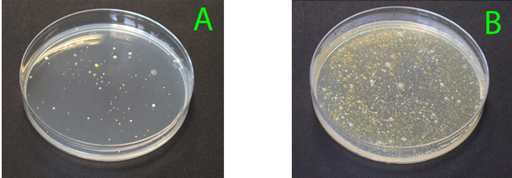
9.4.2 Physical parameters
Do you experience a taste while drinking potable water? Water in its natural state is tasteless, odourless and colourless. Although changes in these parameters may have no direct health effects, a slight change will result in consumer dissatisfaction. Important physical characteristics of drinking water quality are listed in Table 9.2.
| Parameter | Maximum permissible level | Adverse effect |
| Colour | 15 platinum-cobalt units (PCU)* | Unpleasing appearance |
| Odour | Not objectionable | Unappealing to drink |
| Taste | Not objectionable | Unappealing to drink |
| pH | 6.5–8.5 | High pH imparts taste and soapy feel, low pH causes corrosion. For effective disinfection pH is preferably |
| Turbidity | 5 nephelometric turbidity units (NTU)** | Visibly cloudy |
* In platinum-cobalt units the colour is measured by visual comparison of the sample with platinum-cobalt standards. One unit of colour is that produced by 1 mg of platinum per litre of solution (1 mg/l or 1 mg l–1), in the form of the chloroplatinate ion.
**The nephelometric turbidity unit is a measure of the turbidity of the water.
9.4.3 Chemical parameters
Natural water has different elements and compounds in it due to the ability of water to dissolve many substances. Unlike microbial contaminants, most chemical constituents in drinking water only cause adverse health effects after a prolonged period of exposure. A huge concern is if a massive accidental discharge of chemicals occurs in the drinking water system. Experience has shown, however, that in many such incidents, the water will exhibit changes in appearance, taste and odour that prompt consumers to cease using it. For example, if the residual chlorine level exceeds a certain level, consumers notice the taste and immediately reject the water. Ethiopian chemical quality standards for the usual parameters in drinking water are presented in Table 9.3. So, taking aluminium for example, its quantity in 1 litre of water must not exceed 0.2 mg. There are other components that also have limits, such as pesticides, but these will only be analysed for if a case of contamination by these types of substances is suspected.
| Substance | Maximum permissible level (mg l–1) | Health and other risks associated with high intake |
| Aluminium | 0.2 | Deposition of aluminium hydroxide flocs in water pipes and exacerbation of discoloration of water by iron |
| Ammonia | 1.5 | Objectionable (pungent) odour |
| Arsenic | 0.01 | High incidence of skin and possibly other cancers |
| Barium | 0.7 | |
| Boron | 0.3 | |
| Cadmium | 0.003 | The kidney is the main target organ of toxicity |
| Calcium | 75 | |
| Chloride | 250 | Undesirable (salty) taste |
| Chromium | 0.05 | Carcinogenicity suspected of chromium (VI) compounds |
| Copper | 2 | Acute toxicity is high; effects on thyroid and particularly the nervous system if long-term exposure occurs |
| Cyanide | 0.07 | Effects on thyroid and particularly the nervous system if long-term exposure occurs |
| Fluoride | 1.5 | At low concentration, prevents dental caries; at high (7 mg l–1) concentration, increased risk of dental fluorosis; much higher concentration leads to skeletal fluorosis. |
| Iron | 0.3 | Causes reddish-brown colour, promotes iron-bacteria growth and stains laundry and plumbing fixtures |
| Lead | 0.01 | Toxic to both the central and peripheral nervous systems, causing neurological effects |
| Magnesium | 50 | |
| Manganese | 0.5 | Neurotoxicity and other toxic effects |
| Mercury (total) | 0.001 | The kidney is the main target for inorganic mercury, whereas methyl-mercury mainly affects the central nervous system |
| Nitrate (as NO3) | 50 | Causes methaemoglobinaemia in infants and suspected risk of certain forms of cancer |
| Nitrite (as NO2) | 3 | Causes methaemoglobinaemia in infants and suspected risk of certain forms of cancer |
| Potassium | 1.5 | |
| Residual chlorine | 0.5 | |
| Sodium | 200 | Undesirable taste |
| Sulphate | 250 | Causes noticeable taste and corrosion of pipes |
| Total hardness | 300 | |
| Total dissolved solids | 1000 | Undesirable taste |
| Zinc | 5 | Imparts astringent taste and opalescence; develops a greasy film on boiling |
Summary of Study Session 9
In Study Session 9, you have learned that:
- Good governance of a water utility encompasses participation of stakeholders, transparency, responsiveness, consensus, equity and inclusiveness, effectiveness, efficiency, accountability and independence.
- Sound financial management is crucial to ensuring an adequate and safe water supply.
- Asset management is the process of operating and maintaining systems, with the objective of cost-effectively providing the best possible service to users.
- Customer complaints should be handled diplomatically and used as a means to rectify flaws in the system.
- There may be complaints that are unresolvable. These may then have to be passed to an independent party for resolution.
- Drinking water standards exist to ensure the safety of water for human consumption, and they encompass microbial, physical and chemical parameters.
Self-Assessment Questions (SAQs) for Study Session 9
Now that you have completed this study session, you can assess how well you have achieved its Learning Outcomes by answering these questions.
SAQ 9.1 (tests Learning Outcome 9.1)
Match the following words to their correct definitions.
Using the following two lists, match each numbered item with the correct letter.
parameter
drinking water standards
asset management
a.a process that helps to ensure continuous water supply at minimal cost
b.quality parameters set for drinking water
c.any measurable factor
- 1 = c
- 2 = b
- 3 = a
SAQ 9.2 (tests Learning Outcome 9.2)
In Column A of the table below you will find a series of statements related to good governance of a water utility. Select the word or phrase from the following list that best applies to each statement and insert it in Column B:
accountable, effective, efficient, equitable and inclusive, independent, obtaining a consensus, participation, responsive, transparent.
| Column A | Column B |
| Rapidly set up an emergency water supply system with road tankers when the mains supply was cut due to construction work | |
| Make sure everything happens with minimal duplication of effort | |
| Operate free from pressure from local businesses and the village chief | |
| Consider the opinions of all the stakeholders in a project to divert a river, and then arrive at a decision that is acceptable to the majority | |
| Explain to a village why its water supply was cut for three days | |
| Everyone comes together to decide on the location of a water tower | |
| Make sure all the villages in a given area are included in a water supply scheme and that each village gets adequate water for all its needs | |
| Allow people to see the paperwork on how a tender was awarded | |
| Choose the right water treatment method to get rid of fluoride |
Answer
The most appropriate choice of words is shown below.
| Column A | Column B |
| Rapidly set up an emergency water supply system with road tankers when the mains supply was cut due to construction work | responsive |
| Make sure everything happens with minimal duplication of effort | efficient |
| Operate free from pressure from local businesses and the village chief | independent |
| Consider the opinions of all the stakeholders in a project to divert a river, and then arrive at a decision that is acceptable to the majority | obtaining a consensus |
| Explain to a village why its water supply was cut for three days | accountable |
| Everyone comes together to decide on the location of a water tower | participation |
| Make sure all the villages in a given area are included in a water supply scheme and that each village gets adequate water for all its needs | equitable and inclusive |
| Allow people to see the paperwork on how a tender was awarded | transparent |
| Choose the right water treatment method to get rid of fluoride | effective |
SAQ 9.3 (tests Learning Outcome 9.3)
Which of the following statements are false in relation to asset management in a water utility? Give your reasons for choosing them.
- A.Asset management is a process employed solely to ensure water treatment plants operate at their highest efficiency.
- B.In asset management we need to ensure that we have sufficient staff and finances for best service delivery.
- C.The Asset Management Plan once drawn up does not need changing.
- D.Office desks are considered assets in the asset management plan.
- E.Good asset management will help reduce loss of water through pipe bursts.
Answer
A is false. Asset management for a water utility encompasses all the assets related to water supply, not just the water treatment plant.
C is also false. The Asset Management Plan has to be reviewed regularly and revised as necessary.
SAQ 9.4 (tests Learning Outcome 9.4)
Arrange the following tasks in the proper sequence for handling a customer complaint:
- Resolve the complaint.
- Document the complaint and how it was resolved.
- Learn from the complaint and rectify any problems.
- Listen to the complaint.
- Understand the issue.
Answer
The preferred sequence is as follows:
- Listen to the complaint.
- Understand the issue.
- Resolve the complaint.
- Document the complaint and how it was resolved.
- Learn from the complaint and rectify any problems.
SAQ 9.5 (tests Learning Outcome 9.5)
Identify the chemical water quality parameter(s) that would need to be controlled to prevent each of the following conditions.
| Condition | Parameter(s) that need to be controlled |
| Reddish-brown colour in the water | |
| Methaemoglobinaemia | |
| Skin cancer | |
| Salty taste | |
| Damage to the nervous system | |
| Kidney problems | |
| Corrosion of pipes | |
| An objectionable, pungent odour | |
| Fluorosis |
Answer
You should have identified the following chemical substances in the ‘Parameters’ column.
| Condition | Parameter(s) that need to be controlled |
| Reddish-brown colour in the water | Iron |
| Methaemoglobinaemia | Nitrate, nitrite |
| Skin cancer | Arsenic |
| Salty taste | Chloride |
| Damage to the nervous system | Copper, cyanide, lead, manganese, mercury |
| Kidney problems | Cadmium, mercury |
| Corrosion of pipes | Sulphate |
| An objectionable, pungent odour | Ammonia |
| Fluorosis | Fluoride |